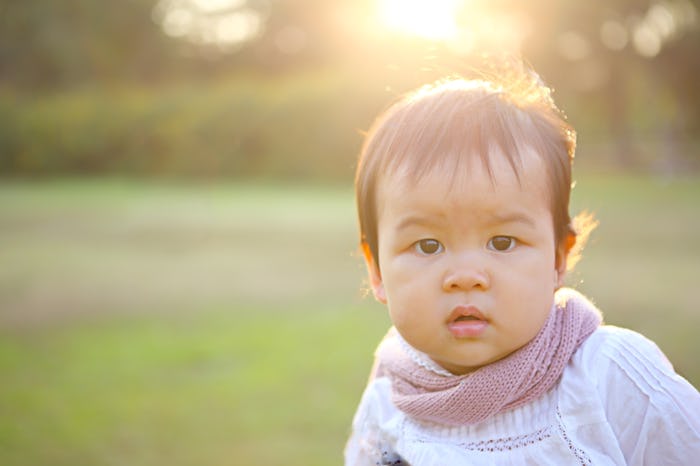Life

Turns Out, Babies *Do* Sweat, But Not In The Way You're Thinking
Babies sweat. Turns out, they sweat a lot. Honestly, this is new information to me. It's not like babies are out there running a 5k or enduring an epic battle of the babies at their local daycare. While it is indeed fascinating to know that babies do sweat, the question that first pops in my head is this: should parents be concerned with a sweaty baby? As a new mom, you've likely already got a long list of worries and concerns (I certainly did). Does your baby sweating need to be one of them?
In an article for Baby Science, pediatrician Wendy Hunter, MD, shared that babies do not sweat before they're born. Living in a liquid environment, mom controls their body temperature, so they don't need to be able to sweat. But once they're born, sweat glands cover their entire body. Despite that, infants can only sweat on their foreheads, as those are the only ones that function at first. As their core body temperature rises, followed by increased metabolism, you may notice your baby sweating from their head.
Then, as the nervous system begins to take control of the body, the rest of baby's sweat glands will begin functioning. In an interview with Live Science, Dr. Eugene Bauer, chief medical officer at Dermira and former dean of Stanford University's School of Medicine, said, "From baby to adult, the number of sweat glands does not change. Therefore, babies have the highest number of sweat glands per square inch, i.e. 8 to 10-fold higher than adults." As a baby grows, they make a few more sweat glands, but mostly the glands they are born with just spread out as the skin grows, according to Dr. Hunter. The situation changes for premature babies, however. They cannot sweat at all until after 37 weeks, as they aren't able to control their body temperature yet.
While all of this is yet another example of just how remarkable the human body is (not to mention great party trivia), the question remains: is it normal? Should parents worry? Dr. Hunter assures the reader that sweating is a sign of baby's normal functioning brain and temperature regulation system. In fact, it would be more concerning if your baby did not sweat at all, as that would be a sign of an abnormal brain, which does not have normal heat-sensing neurons in the hypothalamus.
But is there cause for concern if your baby seems to be excessively sweating and overheated? While sweating is very common, excessive sweating could mean that something is amiss, according to Baby Center. At night, babies can sweat a considerable amount during the deepest part of their sleep cycle, ending up soaking wet. Baby Center reported that, "because babies spend much more time in this deepest stage of sleep, they're more likely to sweat during the night than adults or even older children." This could be possible cause for concern. Excessive sweating can be a sign of congenital heart disease, sleep apnea, and various infections. Overheating during sleep is also a risk factor for sudden infant death syndrome (SIDS), particularly during colder months.
As always, call your pediatrician should you suspect that anything is wrong. In the meantime, if you are worried about nighttime sweating, there are ways to prevent your baby from overheating at night. Experts agree that parents should not use any loose bedding. In fact, the American Academy of Pediatrics (AAP) urges parents to "avoid use of soft bedding, including crib bumpers, blankets, pillows, and soft toys. The crib should be bare." Parents magazine suggested that the ideal temperature for a baby's room should be between 65-70 degrees Fahrenheit. Like most things when it comes to baby's health and wellbeing, keeping an eye on the situation and an open dialogue with your pediatrician.
This article was originally published on